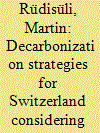|
|
|
Sort Order |
|
|
|
Items / Page
|
|
|
|
|
|
|
| Srl | Item |
| 1 |
ID:
183586


|
|
|
|
|
| Summary/Abstract |
Decarbonizing the energy system by electrification of heat and transport is only effective when using low-carbon electricity sources. As many countries such as Switzerland rely on imported electricity to meet their demand, the greenhouse gas (GHG) content of electricity imports must be correctly accounted for. By assuming an average GHG content for each amount imported, impacts of electricity required in peak periods are underestimated because additional (marginal) demand is primarily met with fossil power plants. This study employs a model to capture marginal GHG contents of imported electricity from a direct and indirect (life-cycle) perspective at an hourly resolution. Implications on GHG are explored for various electricity demand and supply scenarios including electrification of heat and transport, large-scale expansion of renewables, and nuclear phase-out. We find that depending on the scenario, the average GHG intensity of consumed electricity may double, while diurnal and seasonal variations are even larger. Nonetheless, results show substantial GHG mitigation of up to 45% with electrification in case of deploying a diversified electricity generation portfolio including photovoltaics and wind. For optimal GHG mitigation, short-term flexibility as provided by hydropower is necessary to manage electricity surpluses. The main challenge, however, surrounds seasonal energy storage including sector coupling.
|
|
|
|
|
|
|
|
|
|
|
|
|
|
|
|
| 2 |
ID:
105768


|
|
|
|
|
| Publication |
2011.
|
| Summary/Abstract |
How to sustain rapid economic and urban growth with minimised detriment to environment is a key challenge for sustainable development and climate change mitigation in developing countries, which face constraints of technical and financial resources scarcity as well as dearth of infrastructure governance capacity. This paper attempts to address this question by investigating the driving forces of transport demand and relevant policy measures that facilitate mitigating GHG emissions in the urban transport sector in Indian cities based on a critical review of the literature. Our overview of existing literature and international experiences suggests that it is critical to improve urban governance in transport infrastructure quality and develop efficient public transport, coupled with integrated land use/transport planning as well as economic instruments. This will allow Indian cities to embark on a sustainable growth pathway by decoupling transport services demand of GHG emissions in the longer term. Appropriate policy instruments need to be selected to reconcile the imperatives of economic and urban growth, aspiration to higher quality of life, improvements in social welfare, urban transport-related energy consumption and GHG emissions mitigation target in Indian cities.
|
|
|
|
|
|
|
|
|
|
|
|
|
|
|
|
| 3 |
ID:
111095


|
|
|
|
|
| Publication |
2012.
|
| Summary/Abstract |
Energy efficiency in industrial boiler steam systems can be very low due to old technologies, improper design and non-optimal operation of the steam systems. Solutions include efficiency assessments and investments in steam system optimizations, education and training for operators of the systems. This paper presents case studies on assessing and investing in boiler steam systems in China and Vietnam. Methodologies and approaches for data collection and analyses were designed specifically for each of the two countries. This paper concludes: (1) investing in energy efficiency in industrial boiler steam system in China and Vietnam are cost effective; (2) government should not sent national energy efficiency standards lower than that of energy companies or energy equipment manufactures.
|
|
|
|
|
|
|
|
|
|
|
|
|
|
|
|
| 4 |
ID:
132649


|
|
|
|
|
| Publication |
2014.
|
| Summary/Abstract |
This paper develops a system dynamics model of Iceland×s energy sector (UniSyD_IS) that is based on the UniSyD_NZ model of New Zealand×s energy economy. The model focuses on the energy supply sector with endogenous representation of road transport energy demand. Equilibrium interactions are performed across electricity, hydrogen, biofuels, and road transport sectors. Possible transition paths toward a low-carbon transport in Iceland are explored with implications for fuel demand, greenhouse gas (GHG) emissions and associated costs. The consumer sector simulates the long-term evolution of light and heavy-duty vehicles through a vehicle choice algorithm that accounts for social influences and consumer preferences. Through different scenarios, the influences of four fundamental driving factors are examined. The factors are oil price, carbon tax, fuel supply-push, and government incentives. The results show that changes in travel demand, vehicle technologies, fuel types, and efficiency improvements can support feasible transition paths to achieve sufficient reduction in GHG for both 4 °C and 2 °C climate scenarios of the Nordic Energy Technology Perspectives study. Initial investment in supply infrastructure for alternative fuels will not only mitigate GHG emissions, but also could provide long-term economic benefits through fuel cost saving for consumers and reduced fuel import costs for government
|
|
|
|
|
|
|
|
|
|
|
|
|
|
|
|
| 5 |
ID:
179732


|
|
|
|
|
| Summary/Abstract |
We explore the potential role of road pricing in achieving deep GHG mitigation targets, including cordon zones, fuel taxes, VKT fees, and ZEV zones. While most research focuses on a single policy criterion, our comprehensive framework seeks to synthesize insights on five criteria: effectiveness (GHG mitigation), efficiency, equity, political acceptability, and implementation process. Further, we address potential policy mix interactions, and identify critical gaps to guide future research. Although results vary by region, we offer some general findings. First, stringent road pricing can be effective for GHG mitigation in the short- and long-run, especially for passenger vehicles (less so for freight), while also playing a complementary role to vehicle efficiency regulations (mitigating rebound effects). Second, both equity and political acceptability can be improved by careful design of exemptions and usage of revenues – though the ideal design seems to vary considerably by region. Finally, the implementation process is highly important for acceptability, which should include stakeholder consultation, clear communication of benefits, potentially a demonstration and referendum phase, and ideally agreement among political parties. There is much less evidence for ZEV zones, which don't seem necessary for GHG mitigation, though offering ZEV exemptions for road pricing may be an effective design feature.
|
|
|
|
|
|
|
|
|
|
|
|
|
|
|
|
|
|
|
|
|